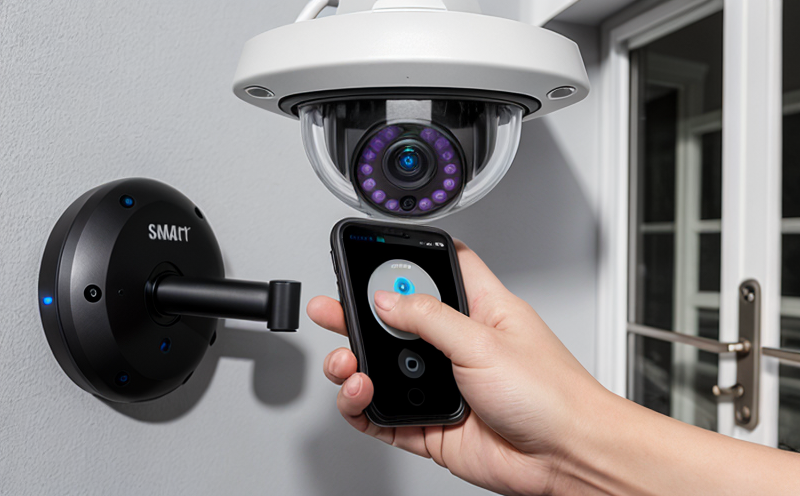ASTM F2957 Smart Lock Functional and Security Testing
The ASTM F2957 standard provides a comprehensive framework to ensure that smart locks meet rigorous functional and security requirements. This service is crucial for manufacturers, quality managers, compliance officers, and R&D engineers who need to verify the reliability and security of their products before bringing them to market.
ASTM F2957 focuses on evaluating the operational integrity of electronic lock mechanisms through a series of predefined tests. These tests simulate real-world scenarios that smart locks encounter in homes and businesses. The standard covers various aspects including mechanical durability, electrical interfaces, communication protocols, and security features such as biometric recognition systems.
The functional testing under ASTM F2957 includes multiple stages designed to assess different components of the lock system. For instance, one part checks how well the electronic interface responds to user commands like opening and closing the door remotely via smartphone apps or voice assistants. Another section evaluates the compatibility between the smart lock’s hardware and software systems ensuring seamless integration with existing home automation networks.
Security assessments are equally important within this standard as they ensure that unauthorized access attempts are effectively thwarted by robust authentication methods. The test protocols may involve attempting to bypass the lock using common attack vectors such as brute force attacks or exploiting vulnerabilities in the wireless communication channels used for remote control.
In addition to these core elements, ASTM F2957 also emphasizes continuous improvement through regular updates based on emerging threats and technological advancements. This proactive approach helps keep manufacturers ahead of potential security risks while maintaining product performance standards over time.
For quality managers looking at improving overall product safety and effectiveness; compliance officers ensuring adherence to industry regulations; or R&D engineers pushing boundaries in innovation, this service offers a robust platform for validating their smart lock designs against recognized benchmarks. By adhering strictly to ASTM F2957 guidelines during development stages, companies can enhance customer trust and satisfaction knowing that their products have been thoroughly vetted by experts.
To sum up, ASTM F2957 Smart Lock Functional and Security Testing is essential for any organization involved in the production or certification of smart security devices. It ensures not only compliance with relevant standards but also enhances brand reputation through proven reliability and enhanced user experience.
Benefits
Implementing ASTM F2957 Smart Lock Functional and Security Testing brings numerous advantages to organizations within the smart home & IoT device sector. Here are some key benefits:
- Enhanced Reliability: By subjecting your product to rigorous testing according to ASTM F2957, you can identify potential weaknesses early in the development process and address them before they become critical issues.
- Better Security: Ensures that all security features function correctly under various conditions, reducing the risk of unauthorized access which is paramount for smart locks.
- Improved User Experience: Consistent performance across different environments helps in delivering a seamless experience for end users. This includes reliable operation through diverse scenarios such as extreme temperatures or humidity levels.
- Regulatory Compliance: Meeting ASTM F2957 standards demonstrates your commitment to adhering to industry best practices and relevant regulatory requirements, thereby enhancing market credibility.
The above benefits translate into increased customer satisfaction and loyalty. Additionally, it can help streamline certification processes by providing clear evidence of compliance with recognized international standards.
Why Choose This Test
- Rigorous Standards: ASTM F2957 provides a stringent set of criteria that ensures the functional integrity and security robustness of smart locks. Compliance with these tests guarantees high-quality products capable of meeting diverse user needs.
- Expertise Assurance: Our team comprises seasoned professionals deeply versed in both technical aspects and practical applications of smart lock technologies. They bring extensive experience to every project ensuring accurate interpretation and application of ASTM F2957 requirements.
- Comprehensive Coverage: This service encompasses all critical areas affecting the performance of smart locks including mechanical parts, electronics interfaces, software components, and security measures like encryption algorithms.
- Customer Support: Throughout the testing process, we offer continuous support to help clients understand test results and make necessary adjustments. Our goal is to ensure that every aspect of your product meets or exceeds expectations set forth by ASTM F2957.
Choosing ASTM F2957 Smart Lock Functional and Security Testing ensures that you receive a thorough evaluation tailored specifically for smart security devices. This approach not only enhances the quality but also strengthens trust among consumers who value advanced technology solutions.
Customer Impact and Satisfaction
The impact of ASTM F2957 Smart Lock Functional and Security Testing extends beyond just product performance; it significantly influences customer satisfaction and loyalty. When customers know their smart locks are rigorously tested according to internationally recognized standards like ASTM F2957, they feel more secure knowing that their investment in home security is well protected.
Here’s how this testing impacts customers:
- Peace of Mind: Knowing that every component has been stress-tested under extreme conditions gives users confidence that their smart lock will perform consistently even when faced with unexpected challenges.
- Ease of Use: Smooth operation across all platforms—from mobile apps to voice commands—ensures a hassle-free experience for the end user. This enhances overall satisfaction and encourages regular use.
- Trust in Brand Reputation: Consistent quality and reliability contribute positively towards building strong brand loyalty among satisfied customers who recommend these products to others.
A well-executed ASTM F2957 Smart Lock Functional and Security Testing process helps establish trust between manufacturers and consumers, fostering long-term relationships built on mutual respect and shared values. This ultimately leads to higher levels of customer satisfaction and increased brand loyalty.





